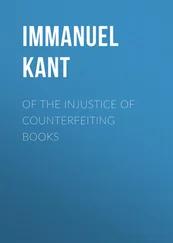The reader must naturally have a strong inducement to co-operate with the present author, if he has formed the intention of erecting a complete and solid edifice of metaphysical science, according to the plan now laid before him. Metaphysics, as here represented, is the only science which admits of completion — and with little labour, if it is united, in a short time; so that nothing will be left to future generations except the task of illustrating and applying it didactically. For this science is nothing more than the inventory of all that is given us by pure reason, systematically arranged. Nothing can escape our notice; for what reason produces from itself cannot lie concealed, but must be brought to the light by reason itself, so soon as we have discovered the common principle of the ideas we seek. The perfect unity of this kind of cognitions, which are based upon pure conceptions, and uninfluenced by any empirical element, or any peculiar intuition leading to determinate experience, renders this completeness not only practicable, but also necessary.
Tecum habita, et noris quam sit tibi curta supellex. 3
Such a system of pure speculative reason I hope to be able to publish under the title of Metaphysic of Nature 4 . The content of this work (which will not be half so long) will be very much richer than that of the present Critique, which has to discover the sources of this cognition and expose the conditions of its possibility, and at the same time to clear and level a fit foundation for the scientific edifice. In the present work, I look for the patient hearing and the impartiality of a judge; in the other, for the good-will and assistance of a co-labourer. For, however complete the list of principles for this system may be in the Critique, the correctness of the system requires that no deduced conceptions should be absent. These cannot be presented a priori , but must be gradually discovered; and, while the synthesis of conceptions has been fully exhausted in the Critique, it is necessary that, in the proposed work, the same should be the case with their analysis. But this will be rather an amusement than a labour.
1 Ovid, Metamorphoses. [xiii, “But late on the pinnacle of fame, strong in my many sons, now exiled, penniless.”]
2 We very often hear complaints of the shallowness of the present age, and of the decay of profound science. But I do not think that those which rest upon a secure foundation, such as mathematics, physical science, etc., in the least deserve this reproach, but that they rather maintain their ancient fame, and in the latter case, indeed, far surpass it. The same would be the case with the other kinds of cognition, if their principles were but firmly established. In the absence of this security, indifference, doubt, and finally, severe criticism are rather signs of a profound habit of thought. Our age is the age of criticism, to which everything must be subjected. The sacredness of religion, and the authority of legislation, are by many regarded as grounds of exemption from the examination of this tribunal. But, if they are exempted, they become the subjects of just suspicion, and cannot lay claim to sincere respect, which reason accords only to that which has stood the test of a free and public examination.
3 Persius. Satirae iv. 52. “Dwell with yourself, and you will know how short your household stuff is.”
4 In contradistinction to the Metaphysic of Ethics. This work was never published.
Preface to the Second Edition, 1787
Table of Contents
Whether the treatment of that portion of our knowledge which lies within the province of pure reason advances with that undeviating certainty which characterizes the progress of science, we shall be at no loss to determine. If we find those who are engaged in metaphysical pursuits, unable to come to an understanding as to the method which they ought to follow; if we find them, after the most elaborate preparations, invariably brought to a stand before the goal is reached, and compelled to retrace their steps and strike into fresh paths, we may then feel quite sure that they are far from having attained to the certainty of scientific progress and may rather be said to be merely groping about in the dark. In these circumstances we shall render an important service to reason if we succeed in simply indicating the path along which it must travel, in order to arrive at any results — even if it should be found necessary to abandon many of those aims which, without reflection, have been proposed for its attainment.
That logic has advanced in this sure course, even from the earliest times, is apparent from the fact that, since Aristotle, it has been unable to advance a step and, thus, to all appearance has reached its completion. For, if some of the moderns have thought to enlarge its domain by introducing psychological discussions on the mental faculties, such as imagination and wit, metaphysical discussions on the origin of knowledge and the different kinds of certitude, according to the difference of the objects (idealism, scepticism, and so on), or anthropological discussions on prejudices, their causes and remedies: this attempt, on the part of these authors, only shows their ignorance of the peculiar nature of logical science. We do not enlarge but disfigure the sciences when we lose sight of their respective limits and allow them to run into one another. Now logic is enclosed within limits which admit of perfectly clear definition; it is a science which has for its object nothing but the exposition and proof of the formal laws of all thought, whether it be a priori or empirical, whatever be its origin or its object, and whatever the difficulties — natural or accidental — which it encounters in the human mind.
The early success of logic must be attributed exclusively to the narrowness of its field, in which abstraction may, or rather must, be made of all the objects of cognition with their characteristic distinctions, and in which the understanding has only to deal with itself and with its own forms. It is, obviously, a much more difficult task for reason to strike into the sure path of science, where it has to deal not simply with itself, but with objects external to itself. Hence, logic is properly only a propaedeutic — forms, as it were, the vestibule of the sciences; and while it is necessary to enable us to form a correct judgement with regard to the various branches of knowledge, still the acquisition of real, substantive knowledge is to be sought only in the sciences properly so called, that is, in the objective sciences.
Now these sciences, if they can be termed rational at all, must contain elements of a priori cognition, and this cognition may stand in a twofold relation to its object. Either it may have to determine the conception of the object — which must be supplied extraneously, or it may have to establish its reality. The former is theoretical, the latter practical, rational cognition. In both, the pure or a priori element must be treated first, and must be carefully distinguished from that which is supplied from other sources. Any other method can only lead to irremediable confusion.
Mathematics and physics are the two theoretical sciences which have to determine their objects a priori . The former is purely a priori , the latter is partially so, but is also dependent on other sources of cognition.
In the earliest times of which history affords us any record, mathematics had already entered on the sure course of science, among that wonderful nation, the Greeks. Still it is not to be supposed that it was as easy for this science to strike into, or rather to construct for itself, that royal road, as it was for logic, in which reason has only to deal with itself. On the contrary, I believe that it must have remained long — chiefly among the Egyptians — in the stage of blind groping after its true aims and destination, and that it was revolutionized by the happy idea of one man, who struck out and determined for all time the path which this science must follow, and which admits of an indefinite advancement. The history of this intellectual revolution — much more important in its results than the discovery of the passage round the celebrated Cape of Good Hope — and of its author, has not been preserved. But Diogenes Laertius, in naming the supposed discoverer of some of the simplest elements of geometrical demonstration — elements which, according to the ordinary opinion, do not even require to be proved — makes it apparent that the change introduced by the first indication of this new path, must have seemed of the utmost importance to the mathematicians of that age, and it has thus been secured against the chance of oblivion. A new light must have flashed on the mind of the first man (Thales, or whatever may have been his name) who demonstrated the properties of the isosceles triangle. For he found that it was not sufficient to meditate on the figure, as it lay before his eyes, or the conception of it, as it existed in his mind, and thus endeavour to get at the knowledge of its properties, but that it was necessary to produce these properties, as it were, by a positive a priori construction; and that, in order to arrive with certainty at a priori cognition, he must not attribute to the object any other properties than those which necessarily followed from that which he had himself, in accordance with his conception, placed in the object.
Читать дальше












